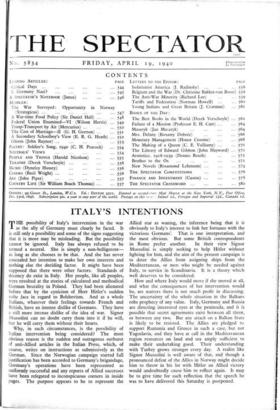ITALY'S INTENTIONS
THE possibility of Italy's intervention in the war as the ally of Germany must clearly be faced. It is still only a possibility and some of the signs suggesting that it is more may be misleading. But the possibility cannot be ignored. Italy has always refused to be termed a neutral. She is simply a non-belligerent- as long as she chooses to be that. And she has never concealed her intention to make her own interests and nothing else the deciding factor. It might have been supposed that there were other factors. Standards of decency do exist in Italy. Her people, like all peoples, were revolted at the stories of calculated and methodical German brutality in Poland. They had been alienated before that by the cynicism of Herr Hitler's sudden volte face in regard to Bolshevism. And as a whole Italians, whatever their feelings towards French and British, have an intense dislike of Germans. They have a still more intense dislike of the idea of war. Signor Mussolini can no doubt carry them into it if he will, but he will carry them without their hearts.
Why, in such circumstances, is the possibility of Italian intervention being considered? The most obvious reason is the sudden and outrageous outburst of anti-Allied articles in the Italian Press, which, of course, writes on instructions as submissively as the German Since the Norwegian campaign started full justification has been accorded to Germany's brigandage, Germany's operations have been represented as uniformly successful and any reports of Allied successes have been relegated to inconspicuous corners in inside pages. The purpose appears to be to represent the Allied star as waning, the inference being that it is obviously to Italy's interest to link her fortunes with the victorious Germans'. That is one interpretation, and the most obvious. But some British correspondents in Rome prefer another. In their view Signor Mussolini is simply seeking to help Hitler without fighting for him, and the aim of the present campaign is to deter the Allies from assigning ships from the Mediterranean, or men who might be needed against Italy, to service in Scandinavia. It is a theory which well deserves to be considered.
How and where Italy would move if she moved at all, and what the consequences of her intervention would be, are matters there is not much profit in discussing. The uncertainty of the whole situation in the Balkans robs prophecy of any value. Italy, Germany and Russia are directing interested eyes at the peninsula, and it is possible that secret agreements -exist between all three, or between any two. But any attack on a Balkan State is likely to be resisted. The Allies are pledged to support Rumania and Greece in such a case, but not Yugoslavia, and they have at call in the Mediterranean region resources on land and sea amply sufficient to make their undertaking good. Their understanding with Turkey grows stronger every day. A realist like Signor Mussolini is well aware of that, and though a pronounced defeat of the Allies in Norway might decide him to throw in his lot with Hitler an Allied victory would undoubtedly cause him to reflect again. It may be to give time for such reflection that the speech he was to have delivered this Saturday is postponed.










































